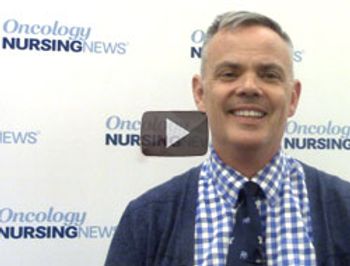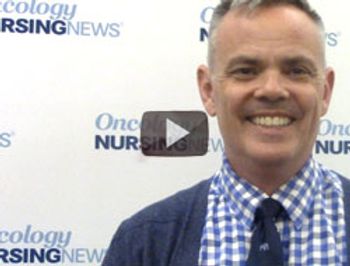
Patients with stage IB, II, or IIIA, EGFR-mutated non–small cell lung cancer derived benefit with adjuvant osimertinib.

Patients with stage IB, II, or IIIA, EGFR-mutated non–small cell lung cancer derived benefit with adjuvant osimertinib.

In the second-line setting, patients with advanced HER2-positive breast cancer derived a superior clinical benefit with trastuzumab deruxtecan compared with treatment with physician’s choice of treatment.

For this episode of “The Vitals,” Aliènne Salleroli, MS, BSN, RN, OCN, discusses her research on equity, diversity, and inclusion in oncology nurse leadership.

An observational study of 2450 patients with stage III colon cancer identified key factors that may increase a patient’s risk of oxaliplatin-induced peripheral neuropathy.

A regimen of cediranib and olaparib improved radiographic progression-free survival in patients with metastatic castration-resistant prostate cancer compared with olaparib monotherapy. However, the rate of dose reductions was doubled with the combination.

"Over the last decade, the landscape of systemic anti-cancer therapy has changed dramatically following the approvals of multiple new targeted therapies," - Kerin Adelson, MD.

Aliènne Salleroli, MS, BSN, RN, OCN, underscores the importance of open dialogue surrounding diversity, equity, and inclusion in oncology leadership.

Pilot programs based out of Yale Cancer Center and Moffitt Cancer Center seek to improve access for newly diagnosed patients with cancer.

An hourly rounding column helped make integrated data points more visible and improve nurse responsiveness on an inpatient floor.

A medication extension set may be the preferred method for subcutaneous hyaluronidase injections compared with a traditional needle.

Brianna Lutz, MSN, RN, OCN, discusses a red-and-green dot hourly column that shows which patients with cancer have been attended to in the past hour.

In the age of cyberattacks, establishing and practicing a downtime procedure is crucial to safeguard patient care, according to Kelli-Ann Mancini, MSN, RN, OCN.

Increasing the number of intravenous port nurse champions across a health care system helps to keep oncology nurses with their patients and reduce care delays.

Independent verification of documentation is paramount to patient safety.

The framework for establishing equity, diversity, and inclusion throughout oncology nursing already exists within the standard for health and safety, explains Aliènne Salleroli, MS, BSN, RN, OCN.

The disparate use in telemedicine between White and Black patients warrants further exploration into compound cases, such as economic and societal factors.

A Yale Cancer Center expert offers a quick glance at the metastatic urothelial cancer treatment landscape.

In this episode of “The Vitals,” 2 veteran oncology nurses discuss the value of mentorship—particularly for novice nurses.

Allogeneic hematopoietic stem cell transplant (HSCT) is still the sole curative therapeutic modality for patients with myelofibrosis.

Smilow Cancer Hospital tested sending patients directly from the post–anesthesia care unit (PACU) to the surgical oncology unit after head and neck surgery to reduce length of stay, postoperative complications, and readmission rates of patients.

The call bell light in room 12-204 was the first to go off at the crack of dawn, breaking the serene silence of the floor. “I need to shower so I can see the race!” the patient exclaimed.

Effective communication can impact patient outcomes, and the patient perspective is critical in assessing these professional communicational skills.

Smilow Cancer Hospital at Yale-New Haven took on a program to assess the effectiveness of mindfulness-based stress relief (MBSR) in patients with cancer.

Leaders from Yale Smilow saw an opportunity to create an educational program to facilitate certification of inpatient and outpatient nurses in hospice and palliative care.

Educating, raising awareness, and implementing an urgent visit program can reduce emergency department use and number of hospitalizations.

Although patients with multiple myeloma and other plasma cell disorders (PCDs) are routinely vaccinated against influenza, studies show that a one-time flu shot does not confer an adequate immune response in these high-risk patients.

"What's your opinion about using hair color?" I asked my doctor shortly before beginning chemotherapy. "I don't have an opinion," he said. "Talk to one of the nurses."

Mark Lazenby, PhD, APRN, FAPOS, associate professor at Yale School of Nursing and incoming president of American Psychosocial Oncology Society (APOS), discusses psychosocial topics that concern APOS.

Mark Lazenby, PhD, associate professor at Yale School of Nursing and incoming president of American Psychosocial Oncology Society (APOS), discusses the universality of psychosocial concerns following a cancer diagnosis.

The American Psychosocial Oncology Society (APOS) partnered with Yale School of Nursing to launch the Screening for Psychosocial Distress Program in 2014.